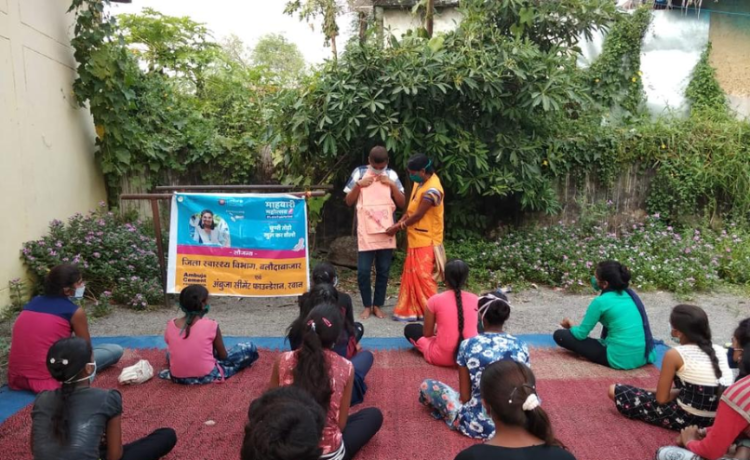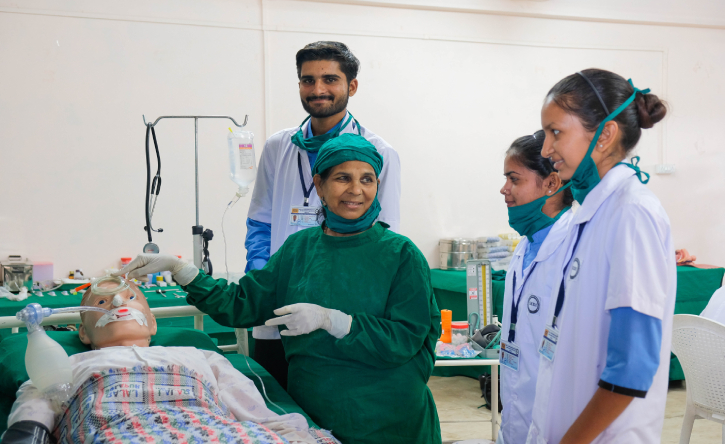The National Skill and Development Corporation under the Pradhan Mantri Kaushal Vikas Yojna (PMKVY) sanctioned Ambuja Foundation’s skill training institutes (SEDIs) to training 440 youth in the General Duty Assistant (GDA) course. 11 SEDI centres from Gujarat, Rajasthan and Maharashtra have been selected to train 40 students per centre in GDA.
Read more

Prahlad Ram and his wife, Parma Devi, have built a reputation for themselves across Rajasthan. It seems their jeera, which is being exported to the US, is being purchased in bulk by the Indian diaspora and rumor has it, even Vice-President Kamla Harris has tried it!
Read more
When COVID-19 closed the doors of his classroom in 2020, Giridhar Panghate hadto think outside the box to reach, and teach, his students. What started as a WhatsApp group of 3-4 students, swelled to 6000 students on Zoom, when Giridhar tried his hand at making educational videos and lvie streaming in classes.
Read more
Never in her wildest dreams did housewife Renu Thakur imagine where cows would take her in life! From Nauni village in Darlaghat all the way to the offices of the Ministry of Finance, Agriculture and Animal Husbandry in the Himachal Pradesh State Government, Renu has been on a wild ride. Renu was one of the 30 founding members of the women only Amrit Dhara Dairy Milk Cooperative, which has grown from strength to strength - swelling to 300 members today.
Read more
Hamirbhai is passionate about water, which is a perfect fit for his role as the community elected ‘Water Operator’ of his village. At just 37 years of age he has become an advocate in the district for promoting ‘water quality testing’ to prevent ill-health among villagers, and has been instrumental in turning the water situation around in over 13 communities.
Read more
Something radical is happening in Inaj village in Veraval, Gir Somnath District. 15 young girls have become the primary breadwinners of their families, having trained in Electronics at SEDI - securing lucrative jobs as Assembly Operators and transforming ingrained perceptions about what women can do.
Read more
Ravikiran Saini is a fourth generation farmer from Bhagwanpur, Uttarakhand. On the surface he may look like a simple farmer, but this man is passionate about organic farming – so passionate and experienced in fact that he moonlights as a regular guest lecturer at IIT Roorkee.
Read more
The art of kitchen gardening is transforming the lives, incomes and health of families across rural India. Promoted as part of Ambuja Foundation’s health programme, this intervention played a crucial role in feeding families and generating incomes during the pandemic - at a time when supplies were restricted during lockdown and going to busy markets, a risk.
Read more
2 Sakhis in Dadri went the extra mile during the pandemic lockdown to help combat COVID-19 and continue promoting other health issues among women. Armed with only mobile phones and a fire in the belly, Sashi Devi and Sudha Kumari embraced ‘digital’ to connect with over 9000 community members.
Read more
When the lockdown of 2020 was relaxed and support staff returned to the AMK campus, they found it in complete disarray. The 2.8 acre campus and sprawling gardens were a mess – a far cry from the clean, manicured gardens AMK usually sports.
Read more
As India celebrated its 75th Independence yesterday, its struggle for independence against COVID-19 still continues. The second wave was a harsh blow for the health administration government and its citizens. But with immediate support from countries, various corporates, organizations and individuals, India was able to control the crisis effectively. Ambuja Cements through its CSR arm, Ambuja Foundation also played a major role at district level working closely with district collectors and local health administrations in fulfilling urgent support and medical requirement in rural areas. For such efforts various districts appreciated the organization on the occasion of Independence day.
Read more
In working among adolescent girls, the importance of menstrual health and hygiene cannot be emphasized less. Myths and taboos are, however, highly prevalent and dispelling them become essential to executing a successful programme in this space.
Read more

